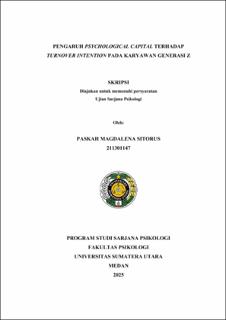Pengaruh Psychological Capital Terhadap Turnover Intention pada Karyawan Generasi Z
The Effect of Psychological Capital on Turnover Intention in Generation Z

Date
2025Author
Sitorus, Paskah Magdalena
Advisor(s)
Pohan, Vivi Gusrini Rahmadani
Metadata
Show full item recordAbstract
Currently, generation Z has not only entered but also begun to dominate the workforce. This generation is known for being ambitious and confident. However, research has shown that since the entry of generation Z into the workforce, turnover rates have increased. Turnover intention is generally considered a key factor influencing employee turnover. Several studies have identified psychological capital as one of the factors that can reduce turnover intention. Psychological capital refers to a positive psychological state, which consists of self-efficacy, hope, optimism, and resiliency. This study aims to determine the effect of psychological capital on turnover intention in generation Z employees. This study employed a quantitative correlational method with convenience sampling as the sampling technique. The sample consisted of 363 generation Z employees in Indonesia. Data were collected using the Positive Psychological Capital scale by Manurung (2016) consisting of 23 items, and the Turnover Intention scale by Pinandito and Savira (2022) consisting of 3 items. The data were analyzed using simple linear regression. Based on the statistical analysis, a significance value of < 0.001 (p < 0.05) was obtained, with a regression coefficient value of -0.159, and an R square value of 0.290. The result showed that the hypothesis was accepted, meaning that psychological capital has a significant negative effect on turnover intention among generation Z employees. Psychological capital accounts for 29% of the variance in turnover intention and the remaining 71% is influenced by other factors.
Collections
- Undergraduate Theses [1451]
